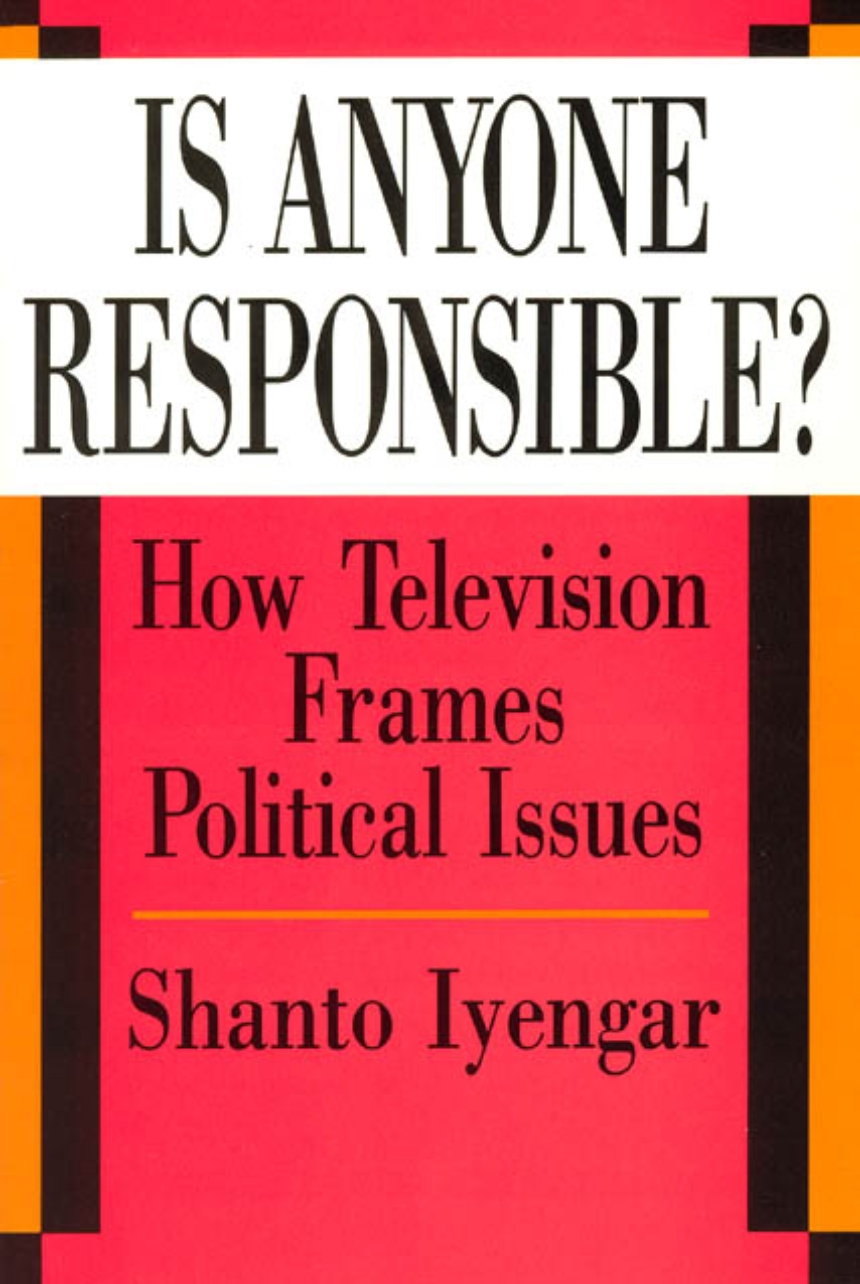Is Anyone Responsible?
How Television Frames Political Issues
A disturbingly cautionary tale, Is Anyone Responsible? anchors with powerful evidence suspicions about the way in which television has impoverished political discourse in the United States and at the same time molds American political consciousness. It is essential reading for media critics, psychologists, political analysts, and all the citizens who want to be sure that their political opinions are their own.
"Not only does it provide convincing evidence for particular effects of media fragmentation, but it also explores some of the specific mechanisms by which television works its damage. . . . Here is powerful additional evidence for those of us who like to flay television for its contributions to the trivialization of public discourse and the erosion of democratic accountability."—William A. Gamson, Contemporary Sociology
"Iyengar’s book has substantial merit. . . . [His] experimental methods offer a precision of measurement that media effects research seldom attains. I believe, moreover, that Iyengar’s notion of framing effects is one of the truly important theoretical concepts to appear in recent years."—Thomas E. Patterson, American Political Science Review
"Not only does it provide convincing evidence for particular effects of media fragmentation, but it also explores some of the specific mechanisms by which television works its damage. . . . Here is powerful additional evidence for those of us who like to flay television for its contributions to the trivialization of public discourse and the erosion of democratic accountability."—William A. Gamson, Contemporary Sociology
"Iyengar’s book has substantial merit. . . . [His] experimental methods offer a precision of measurement that media effects research seldom attains. I believe, moreover, that Iyengar’s notion of framing effects is one of the truly important theoretical concepts to appear in recent years."—Thomas E. Patterson, American Political Science Review
206 pages | 22 figures, 19 tables | 6 x 9 | © 1991
American Politics and Political Economy Series
Political Science: Political Behavior and Public Opinion
Psychology: Social Psychology
Sociology: Collective Behavior, Mass Communication
Table of Contents
Acknowledgments
Introduction
1: Why Responsibility Matters
2: Framing Effects of News Coverage
3: Methods of Research
4: Effects of Framing on Attributions of Responsibility for Crime and Terrorism
5: Effects of Framing on Attributions of Responsibility for Poverty, Unemployment, and Racial Inequality
6: Effects of Framing on Attributions of Responsibility for the Iran-Contra Affair
7: Effects of Attributions on Issue-Specific Opinions
8: Effects of Attributions on General Opinions
9: The Role of Individual Differences
Conclusion
Appendix A: Content Analysis
Appendix B: Field Experiments
Appendix C: Correlational Analysis
Notes
References
Index
Introduction
1: Why Responsibility Matters
2: Framing Effects of News Coverage
3: Methods of Research
4: Effects of Framing on Attributions of Responsibility for Crime and Terrorism
5: Effects of Framing on Attributions of Responsibility for Poverty, Unemployment, and Racial Inequality
6: Effects of Framing on Attributions of Responsibility for the Iran-Contra Affair
7: Effects of Attributions on Issue-Specific Opinions
8: Effects of Attributions on General Opinions
9: The Role of Individual Differences
Conclusion
Appendix A: Content Analysis
Appendix B: Field Experiments
Appendix C: Correlational Analysis
Notes
References
Index
